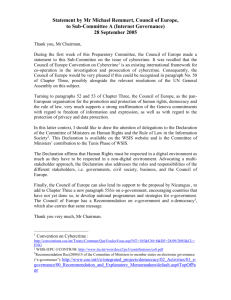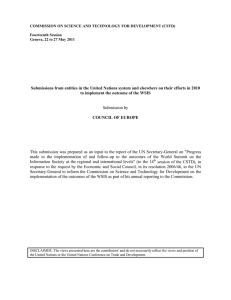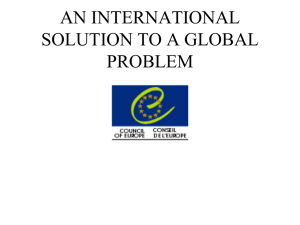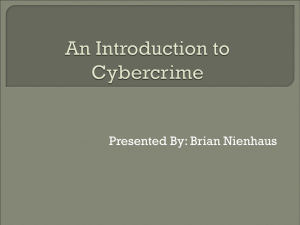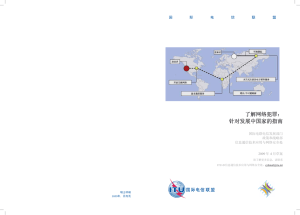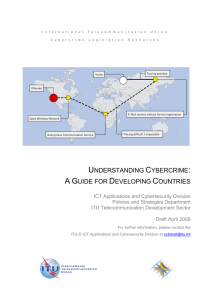COMMISSION ON SCIENCE AND TECHNOLOGY FOR DEVELOPMENT (CSTD) Fifteenth Session
advertisement
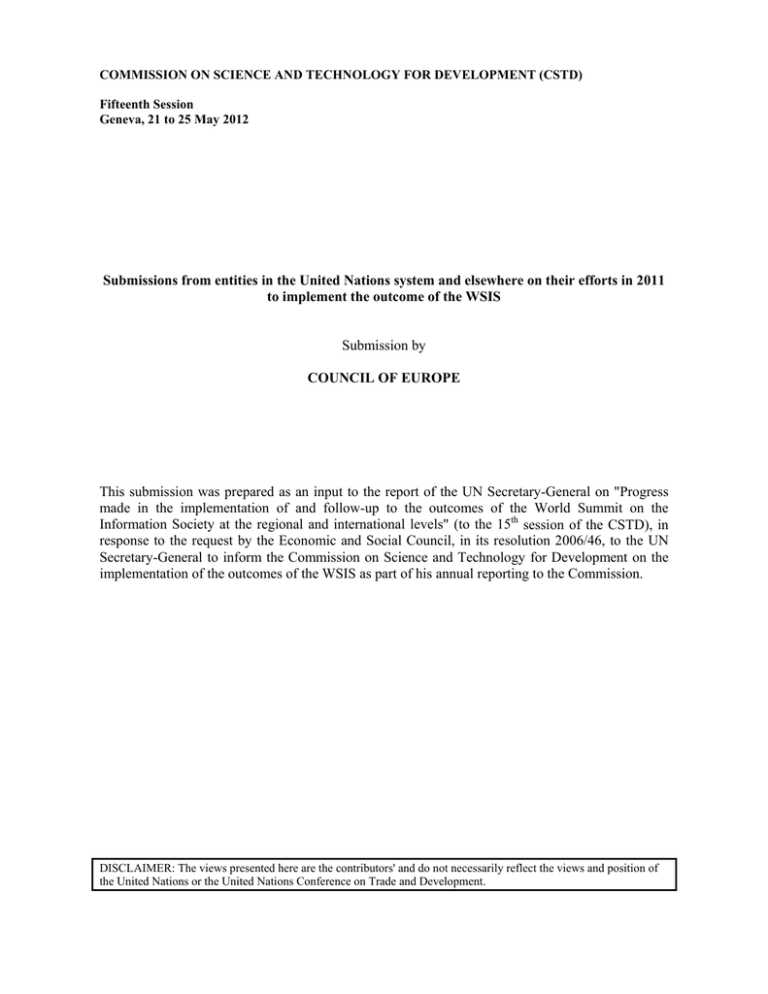
COMMISSION ON SCIENCE AND TECHNOLOGY FOR DEVELOPMENT (CSTD) Fifteenth Session Geneva, 21 to 25 May 2012 Submissions from entities in the United Nations system and elsewhere on their efforts in 2011 to implement the outcome of the WSIS Submission by COUNCIL OF EUROPE This submission was prepared as an input to the report of the UN Secretary-General on "Progress made in the implementation of and follow-up to the outcomes of the World Summit on the Information Society at the regional and international levels" (to the 15th session of the CSTD), in response to the request by the Economic and Social Council, in its resolution 2006/46, to the UN Secretary-General to inform the Commission on Science and Technology for Development on the implementation of the outcomes of the WSIS as part of his annual reporting to the Commission. DISCLAIMER: The views presented here are the contributors' and do not necessarily reflect the views and position of the United Nations or the United Nations Conference on Trade and Development. 2 FOLLOW-UP AND IMPLEMENTATION OF THE WORLD SUMMIT ON THE INFORMATION SOCIETY Reply of the Council of Europe Secretariat January 2012 3 1. Executive summary In 2011, based on its core values of human rights, rule of law and democracy, the Council of Europe provided governments with international law platforms to facilitate the implementation of Internet-related treaties including: - Convention on the counterfeiting of medical products and similar crimes involving threats to public health (CETS No.211) – opened for signature in October 2011, Convention on the Protection of Children against Sexual Exploitation and Sexual Abuse (CETS No.201), Convention for the Prevention of Terrorism (CETS No.196), Budapest Convention on Cybercrime (CETS No.185), Convention on the Protection of Individuals with regard to the Automatic Processing of Personal Data (CETS No.108; also known as “Convention 108”) and its additional Protocol. This was complemented by the adoption of a series of Recommendations and Declarations by the member states of the Council of Europe on Internet freedom, notably: - freedom of expression and freedom of assembly and association with regard to privately operated Internet platforms and online service providers (new Declaration adopted in December 2011), Internet governance principles (new Declaration adopted in September 2011), universality, integrity and openness of the Internet (new Recommendation adopted in September 2011), freedom of expression and assembly in relation to domain names (new Declaration adopted in September 2011), ‘new notion of media’, in particular the freedoms and responsibilities of online media including Internet intermediaries (new Recommendation adopted in September 2011). At European and international levels, the Council of Europe also participated in, supported and facilitated multi-stakeholder dialogue on a range of Internet related issues regarding freedom of expression on the Internet, the protection and empowerment of children on the Internet, the protection of personal data and privacy, and security measures against cybercrime, xenophobia and racism. 2. Analytical overview of trends and experience in implementation Work continued on the modernisation of the Convention 108. In September 2011, the Organisation of American States (OAS) expressed its support for Convention 108 and included reference to it in its comparative study of privacy frameworks, as part of a new memorandum of understanding signed between OAS and the Council of Europe. The Organisation also continued its global efforts against cybercrime in line with the Budapest Convention on Cybercrime, noting on the one hand, shortcomings such including the lack of resources to support developing countries, and on the hand, stronger cybercrime legislation continues which is underway in more than 100 countries using the Budapest Convention as a guideline. Activities on child online safety did not lead to specific outputs in 2011, they have instead been integrated into the Council of Europe’s longer term strategies (2012-2015) on children and on Internet governance. 4 3. Innovative policies, programmes and projects undertaken Internet governance was a prominent feature of the Council of Europe’s work in 2011. The 47 Member states agreed on new standard-setting and monitoring work in its “good governance, internet and media” programme (ranging from libel tourism to rights of Internet users or even positive use of ICTs). The Steering Committee on media and information society (CDMSI) will have a broad mandate that includes: - oversight of the Council of Europe’s new (draft) strategy on Internet governance 20122015 (see below), drawing up a compendium of existing human rights for Internet users, developing standards to protect and preserve the unimpeded cross-border flow of legal Internet content, ensuring personal data and the right to private life are better protected in the Information society. A range of Internet-related events were organised and facilitated by the Council of Europe in 2011 with increasing emphasis on multi-stakeholder outreach and dialogue: - Conference on ‘Internet Freedom – From Principles to Global Treaty Law? Content, Stakeholders, Form’ (Strasbourg, 18-19 April) which brought together over 150 representatives of both Council of Europe member and non-member states, civil society and the private sector. The conference discussed Internet governance principles and possible models to ensure the sustainability of the Internet; - High level Council of Europe - European Commission event on the occasion of Data Protection Day (Brussels, 28 January) which marked the 30th Anniversary of Convention 108, gathering other 300 participants from all sectors and enabling the launch of a public consultation on its modernisation; - Council of Europe coordination support for the fourth edition of the European Dialogue on Internet Governance (Belgrade, 30 and 31 May 2011) which was organised by the Serbian authorities and a number of other stakeholders. Involving 550 people from a wide range of stakeholder groups, there was multi-stakeholder dialogue on many of the themes related to WSIS action lines; - Council of Europe events and participation in the IGF (Nairobi, 27-30 September 2011) that related to several WSIS action line themes. Contributing to its overall theme ‘Internet as a catalyst for change: access, development, freedoms and innovation', the Council of Europe presented its most recent work to protect human rights online and to provide an adequate legal framework for the Internet; - Council of Europe’s seventh edition of its Forum for the Future of Democracy (Limassol, Cyprus, October 2011), which recommended, inter alia, to “build upon the recent mobilisation of people across the European continent and beyond to foster and promote constructive political engagement in democratic processes and support the use of new and alternative forms of democratic expression and participation, amplified by social networks, as a complement to representative democracy”; - Council of Europe and the Federal Ministry for European and International Affairs of Austria conference ‘Our Internet - Our rights, Our freedoms / Towards the Council of Europe strategy on Internet (Vienna, 24-25 November 2011). As regards specific WSIS action lines, the Council of Europe contributed to the implementation of WSIS principles in the following areas: 5 C5 - building confidence and security in the use of ICTs - Combating cybercrime with regard to the implementation of the Budapest Cybercrime Convention worldwide as a common framework for global action. Support was provided through the Global Project on Cybercrime (Phase 2) which not only focuses on the strengthening of legislation, but also on data protection, the protection of children, criminal money flows on the internet, the training of judges and efficient international cooperation. In addition, a joint project of the European Union and the Council of Europe on cooperation against cybercrime in South-eastern Europe (CyberCrime@IPA) continued in 2011. A project for countries of Eastern Europe started on 1 April 2011 (Cybercrime@EAP). In addition, the Octopus conference on co-operation against cybercrime (Strasbourg, 21-23 November 2011) coincided with the 10th anniversary of the Budapest Convention on Cybercrime and confirmed the impact of this treaty worldwide since it was opened for signature on 23 November 2001; - Combating counterfeit medicines, including those sold over the Internet, with reference to the new Council of Europe Convention on the subject; - Addressing ‘cloud computing’ in the European Dialogue on Internet Governance (EuroDIG – Belgrade, 30-31 May 2011) workshop on “Open hour on cloud computing: from fog to secure cloud – a regulatory perspective”; - Addressing also data protection and challenges posed by the use of ICTs in the EuroDIG 2011 workshop on “the privacy standards that we want”. C9 - media - Offering policy guidance to member states on a ‘new notion of media’ that serves to protect means of mass communication or mass communication in aggregate in the new technological landscape (social networks, search engines, platforms aggregating content, large-scale online electronic games); - Advancing community thinking on “globally-applicable principles on public policy issues associated with the Internet” (Tunis Agenda), in particular, by elaborating Internet governance principles and states’ commitments to a framework on the universality, integrity and openness of the Internet; - Raising awareness on the challenges that independent media, online service providers and websites of human rights defenders and whistleblowers face vis-à-vis politically motivated pressures and cyber attacks. C10 – ethical dimensions of the Information Society Following two separate requests of UNESCO, the Council of Europe Secretariat provided written input to the draft Code of Ethics prepared by the Information For All Programme (IFAP), and on privacy issues related to Internet. 6 4. Future actions and initiatives to be taken regarding implementation In February 2012, the draft Council of Europe Strategy on Internet Governance 2012-2015 is scheduled for adoption. The draft identifies priorities and sets goals to advance the protection and respect for human rights, the rule of law and democracy on the Internet. Its main objectives include: - protecting the Internet’s universality, integrity and openness; maximising rights and freedoms for Internet users; advancing data protection and privacy; enhancing the rule of law and effective co-operation against cybercrime; maximising the Internet’s potential to promote democracy and cultural diversity; protecting and empowering children and young people. There will also be standard setting work which ties in with WSIS targets that focuses on protecting human rights in the new media landscape (social networks, search engines, public service media governance, and rights of Internet users possibly through the elaboration of a compendium of Internet rights). With new data protection challenges arising everyday, Convention 108 will be overhauled to meet new realities. The technological developments of the information and communication society as well as the globalisation of exchanges lead to unexplored challenges and potential new risks for the protection of personal data. The Council of Europe is assessing if the protection provided is still in line with today’s needs and is to this end modernising the Convention. The Council of Europe will also be providing secretariat support for the fifth edition of EuroDIG (Stockholm on 14 and 15 June 2011) and will be contributing to the seventh edition of the IGF (Baku, Autumn 2012). Moreover, the Organisation will also be: 1 - organising a specific session on Convention 108 on the occasion of data protection day, in the framework of the International Conference on privacy, data protection and computers (Brussels 25-27 January 2012); - organising its global Octopus Interface Conference on cybercrime in Strasbourg from 6 to 8 June 2012). The conference will focus in particular on transborder access to data and jurisdiction in the context of cloud computing as well as public-private information exchange; - seeking a continuum for its biennial meetings, held since 2006, to review developments in the field of e-voting and the implementation of its Committee of Ministers’ Recommendation on legal, operational and technical standards for e-voting (CM/Rec(2004)11) by establishing a public-private partnership with the NGO e-voting1; - examining international law action possibilities in respect of the preservation of crossborder flow of Internet traffic. http://www.coe.int/t/dgap/democracy/Activities/GGIS/Default_en.asp
